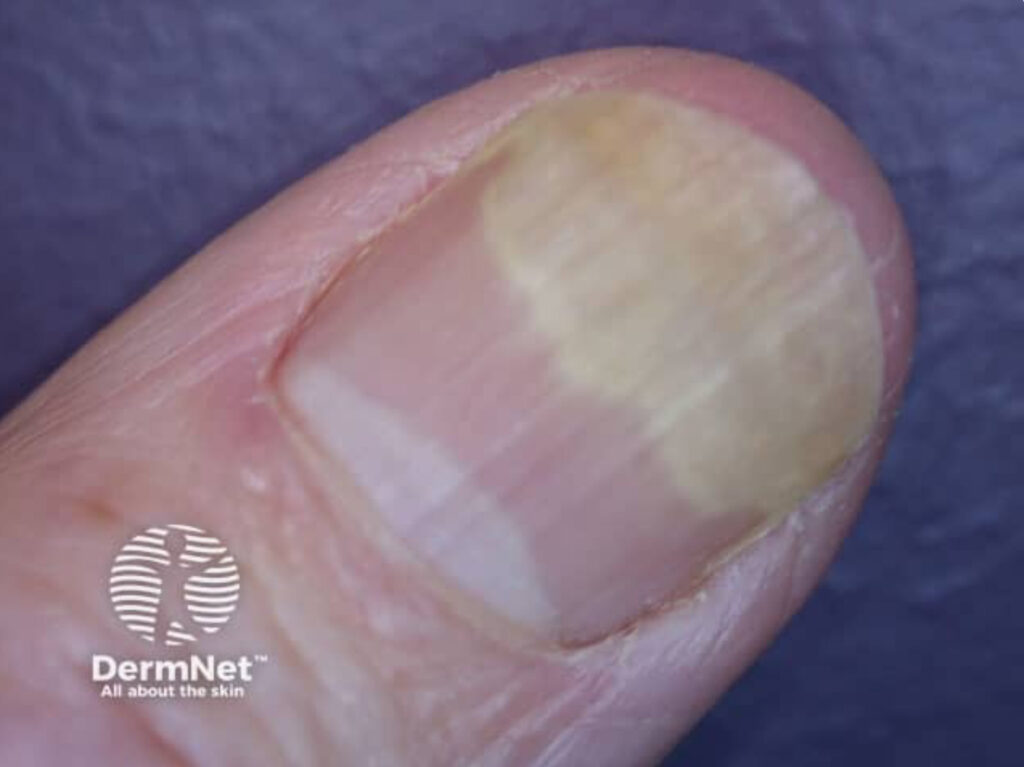What Your Feet Reveal About Your Thyroid Health
Your feet are trying to tell you something about your thyroid health.

Thyroid disease is more common in women and more common with age, so if you’re a woman over 40, you have at least a one in ten chance that something is going on with your thyroid, per this study.
Your feet can tell a surprising amount about what’s happening inside your body — including the health of your thyroid.
In functional medicine, we know that the body communicates through subtle signs and symptoms long before lab numbers become abnormal. I know it sounds weird, but hypothyroidism and autoimmune thyroiditis can show up in your feet.
From cold toes and cracked heels to swelling and Raynaud’s phenomenon, these signs often point toward hormonal and metabolic imbalances. They are more than cosmetic or dermatological annoyances.
Discover how your feet can reveal thyroid dysfunction and how functional medicine helps you heal from the inside out.
The Thyroid–Feet Connection
The thyroid gland, located at the base of your neck, produces thyroid hormones (predominantly T4, and a small amount of T3) that influence virtually every cell in your body. These hormones regulate metabolism, temperature control, circulation, nerve function, detoxification, digestion, immune function and tissue repair.
When the thyroid is underactive (hypothyroidism) or overactive (hyperthyroidism), the feet often reflect these internal imbalances because they’re at the body’s farthest point from the heart — where circulation and temperature regulation are most vulnerable.
Cold, Pale Feet and Raynaud’s: Clues of Sluggish Thyroid Function
Cold feet are one of the earliest and most classic signs of an underactive thyroid. When thyroid hormones are low, blood vessels constrict and circulation slows. This means less oxygen and warmth reach your extremities, leaving your feet icy cold even when the rest of your body feels fine.
For some, this reduced circulation develops into Raynaud’s phenomenon — a condition where the fingers and toes temporarily lose blood flow, turning white, then blue, and finally red as circulation returns. Raynaud’s phenomenon may be an early clue to the diagnosis of hypothyroidism. It’s also often associated with Hashimoto’s autoimmune thyroiditis and low metabolic rate.
Supporting thyroid health and improving microcirculation can dramatically reduce these episodes. Functional medicine strategies such as restoring optimal thyroid hormone levels, balancing the adrenals, optimizing gut health and nutrient sufficiencies as well as addressing other root-causes can all improve blood flow and vascular resilience.
Reversing Raynaud’s with the Functional Medicine
One of my functional medicine clients came to me with a long history of Raynaud’s phenomenon — her symptoms had begun over 20 years earlier, and she received a formal diagnosis about 15 years ago. When she first came to see me, she was experiencing severe symptoms, including complete loss of cuticles on both big toes, along with persistent pain, redness, and inflammation around the nail beds.
Despite undergoing several rounds of antibiotics and other medications for presumed toenail infections, her condition did not improve — in fact, it worsened, eventually leading to progressive nail loss. Her conventional thyroid testing included only the TSH marker, which had always appeared “normal.” However, when we performed a comprehensive functional thyroid panel, the results revealed autoimmune activation consistent with Hashimoto’s thyroiditis, as well as nutrient deficiencies that were compromising microcirculation and tissue repair.
This case beautifully illustrates the interconnectedness between thyroid function, vascular tone, immune balance, and skin barrier integrity. When thyroid hormones are low and inflammation is active, blood flow and nutrient delivery to distal tissues — such as the toes — become impaired, resulting in poor healing and tissue breakdown. As we worked to restore thyroid balance, support immune, gut, adrenal, and detoxification systems, and replenish key micronutrients, her cuticles gradually regenerated, inflammation subsided, and circulation markedly improved.
Puffy Ankles and Fluid Retention
Long-standing, “full-blown” untreated hypothyroidism can precipitate a life-threatening condition called myxedema coma, characterized by the accumulation of a protein and sugar complex in the skin, leading to swelling and a waxy or rubbery appearance around the feet and ankles. Anyone with hypothyroidism, regardless of root-causes, can develop myxedema coma. Infections, including pneumonia, viral infections, urinary tract infections / UTIs, cellulitis and septicemia are the leading precipitating factors for myxedema coma.
Even with early discovery and treatment, the survival rate can vary. Some studies show it as high as 60%, while others report it between 20% to 25%, even with intensive care in the hospital.
The ideal way to manage this condition is to prevent it from occurring in the first place by optimizing thyroid health and function. If you have symptoms of low thyroid function and your lab work looks “fine”, you might still have subclinical hypothyroidism or misdiagnosed hypothyroidism, in particular if your thyroid panel includes only TSH, sometimes along with the T4. Read this blog post about Thyroid Lab Missteps and essential markers you need to know about when testing for the thyroid health and function.
Functional medicine helps to address and reverse root-causes of hypothyroidism and autoimmune thyroiditis, subsequently addressing myxedema coma. As thyroid health is optimized and hormones normalize, this fluid retention gradually subsides — a clear external sign that internal healing is taking place.
Dry, Cracked Heels and Thickened Skin
Thyroid hormones are one of the key regulatory hormones for skin homeostasis, by accelerating barrier formation, regulating cell turnover and sebum (oil) production.
Hypothyroidism can hinder the epidermal barrier function. Low thyroid function can lead to very dry, thickened, cracked heels and rough patches that resist typical moisturizers. These changes are especially pronounced in winter months when circulation and skin hydration are already challenged.
Tingling, Numbness, and Nerve Pain
Thyroid hormones are crucial for nervous system development and function. An underactive thyroid can slow nerve conduction and impair how nerves send signals, leading to tingling, burning, or numb sensations — a condition called peripheral neuropathy.
This condition improves as inflammation is addressed and thyroid function is restored.
Brittle Nails
Healthy nails depend on thyroid hormones for protein synthesis and circulation. When thyroid output declines, nails may become brittle, thin, and/ or develop ridges due to a reduced metabolic rate and poor blood circulation. As a result, decreased blood flow impairs nutrient delivery to the nail bed, hindering keratin production and nail growth. This results in fragile, brittle, thick and slow-growing nails.
These are subtle but valuable external signs that point toward poor metabolism, impaired circulation and nutrient insufficiencies.
When the Thyroid Is Overactive
In contrast, hyperthyroidism speeds up metabolism and circulation, leading to warm, moist, or sweaty feet. Some clients describe a “restless” or trembling sensation in their legs and feet. In Graves’ disease, an autoimmune form of hyperthyroidism, a distinct thickening and redness of the skin (called pretibial myxedema) can appear on the shins and tops of the feet. It also occasionally occurs in Hashimoto’s thyroiditis.
Onycholysis is a condition, where the nail plate separates from the nail bed, resulting in a gap between the nail and the skin, can be an early indicator of hyperthyroidism and Grave’s disease.

Image of Onycholysis.
Photo Credit: DermNet
Itchy Feet due to Thyroid Disorders
Itchy feet can sometimes reflect underlying thyroid health problems.
In hypothyroidism, a slowed metabolism often leads to very dry, rough skin that can become flaky and itchy, especially on the soles and heels.
In contrast, hyperthyroidism and autoimmune thyroid conditions such as Hashimoto’s or Graves’ disease may trigger inflammatory skin reactions or rashes, causing persistent itching known as pruritus.
Research also shows a connection between chronic idiopathic urticaria (hives) and autoimmune thyroid disease, suggesting that ongoing skin irritation may stem from immune dysregulation and antigen buildup at the site.
Foot Pain or Plantar Fasciitis
Foot pain — especially chronic heel pain or plantar fasciitis — can often be an overlooked sign of thyroid imbalance. In hypothyroidism, slowed metabolism and reduced thyroid hormone levels impair collagen synthesis, tendon elasticity, and tissue repair. The plantar fascia, a thick band of connective tissue supporting the arch of the foot, becomes more vulnerable to microtears, stiffness, and inflammation when thyroid function is suboptimal.
Thyroid hormones are also closely tied to mitochondrial energy production within cells. When cellular energy is low, tissues heal more slowly, and chronic inflammation can develop in high-stress areas such as the feet. Additionally, low thyroid function often coexists with suppressed or elevated cortisol, nutrient deficiencies/ insufficiencies, and poor circulation — all of which can prolong recovery from plantar fasciitis.
Reversing Plantar Fasciitis with the Functional Medicine
One of my functional medicine clients struggled with recurring heel pain that worsened after long periods of standing, despite orthopedic treatments. Upon deeper evaluation, her thyroid panel revealed suboptimal Free T3 and mildly elevated Reverse T3, indicating reduced peripheral or tissue-level thyroid activity. After addressing her thyroid conversion issues, adrenal dysregulation and cellular respiration, optimizing her gut health and nutrient status, and supporting collagen repair, she no longer experiences any heel pain. This case underscores how thyroid-driven connective tissue and mitochondrial dysfunction can manifest as persistent foot pain long before overt hypothyroidism is diagnosed.
Fungal Infections
Another subtle but important connection between the thyroid health and feet lies in the immune system’s regulation of microbial balance or lack of it. Individuals with hypothyroidism or autoimmune thyroid disease (such as Hashimoto’s or Grave’s disease) often experience recurrent fungal infections — including athlete’s foot, toenail fungus, or chronic yeast overgrowth.
Functionally, low thyroid activity slows cellular turnover, lymphatic drainage, and sweat gland activity, creating an environment where fungi can thrive. In addition, low stomach acid (hypochlorhydria) — a common feature of hypothyroidism — disrupts the gut microbiome, leading to systemic candida overgrowth and reduced immune surveillance at the skin level. When immune system becomes weak and detoxification pathways are sluggish, the skin and nails become vulnerable entry points for fungal organisms.
In my functional medicine practice, I’ve seen this pattern frequently: a client presenting with persistent toenail fungus resistant to topical treatments later tests positive for autoimmune thyroid markers and gut dysbiosis. Once we supported her thyroid health and function, restored microbial balance through a functional anti-fungal and gut-repair protocol, and optimized detox pathways, digestion and metabolic health, the fungal infection finally resolved — confirming the powerful interconnection between thyroid health, immunity, and skin integrity.
Functional Medicine Approach: Healing from the Inside Out
As a Functional Medicine Practitioner, I see the body as an interconnected system — the skin and extremities are mirrors of what’s happening inside and reflect the status of your health or lack of it, for that matter. When evaluating thyroid health, I look beyond TSH and T4. I don’t ignore your symptoms and I create a treatment plan based on your unique health history and symptoms.
Once we understand the full picture, we can support your thyroid health and circulation naturally through:
- Targeted nutrition
- Detoxification and liver support
- Adrenal support and cortisol regulation
- Optimizing sleep and digestion
- Restoring gut microbial balance and integrity
- Addressing immune function (autoimmunity)
Your feet are not just a foundation for movement — they’re a reflection of your internal health. From cold toes to fungal infections and athlete’s foot to cracked heels, the thyroid’s influence reaches all the way to your soles. Paying attention to these clues can help you identify imbalances early, support your thyroid health and body holistically, and feel grounded and vibrant in your health again — from head to toe. Don’t ignore your symptoms — your body tries to communicate with you via the symptoms and is strongly asking for your help.
If you’re experiencing chronic cold feet, dryness, or swelling, fungal infections or other dermatological issues, it may be time to explore whether your thyroid could be the underlying cause. Book your Comprehensive Functional Medicine Health Assessment Consultation to gain a complete understanding of the root causes and triggers behind your imbalances and thyroid problems. This in-depth evaluation is followed by a three-month VIP program that provides a personalized healing plan designed to address those underlying root-causes, reverse chronic health patterns, and restore optimal thyroid health and function — one of the body’s most vital systems on which the rest of the body relies upon, supporting energy, metabolism, immune function, digestion, detoxification, and overall wellbeing.

As a Certified Functional Medicine Practitioner my Expertise Encompasses:
- Immune System: frequent illness, UTIs, yeast infections
- Allergies, Asthma
- Skin Problems: acne, cystic acne, rosacea, dermatitis, ichthyosis, psoriasis, vitiligo, melasma
- Inflammation: arthritis, rhinitis, joint & muscle pain, migraines, headaches
- Sleep Disturbunces, Insomnia
- Gut Problems: IBS/IBD, bloating, acid reflux, gas, constipation, diarrhea, parasites, fungal/yeast overgrowths
- Hormonal Imbalances: PCOS, PMS symptoms, weight problems/inability to lose weight, thyroid problems
- Hair Loss, Alopecia
- Mood Imbalances: anxiety, depression, irritability
- Metabolic Dysfunction, Insulin Resistance, Type 2 Diabetes
- Optimizing Wellness for Successful Pregnancy
- Autoimmune Conditions: Hashimoto’s thyroiditis, grave’s disease, reumatoid arthritis (RA), lupus, etc
- Bone Health: osteopenia/ osteoporosis
- Effective Anti-Aging Strategies without Injectables with the inside-out & outside-in approach
- Detoxification of Heavy Metals, Mycotoxins, Environmental Toxins
- Reversing Breast Implant Illness
- Preparation for the Explant Surgery and Optimization of Wellness & Vitality Post-Explant
With Love and Gratitude,
Natalie Maibenko
Functional Medicine Practitioner
DISCLAIMER:
Information and content on this website is provided for information and educational purposes only, and is not intended as a substitute for the advice provided by your physician or other healthcare professional. No information offered here should be interpreted as a diagnosis of any disease, nor an attempt to treat or prevent or cure any disease or condition. If you have any concerns or questions about your health, you should always consult with a physician or other healthcare professional. Do not disregard, avoid, or delay obtaining medical or health-related advice from your healthcare professional. Always speak with your healthcare provider before taking any medications or supplements and before making any changes to your health regimen. Information provided on this website does not create a doctor-patient relationship between you and any professional affiliated with this website. Information and statements regarding dietary supplements have not been evaluated by the Food and Drug Administration and are not intended to diagnose, treat, cure or prevent any disease. I am not acting in the capacity of a doctor, licensed dietitian-nutritionist, therapist, or psychologist and will not diagnose, treat or cure any disease, condition or other physical or mental ailment of the human body. Rather I serve as a mentor and guide who helps a client to reach her/his own health and wellness goals through implementing incremental, positive, healthy, sustainable lifestyle changes that help the client to live and thrive using simple methods.
